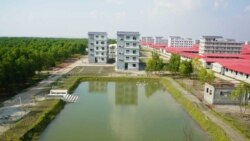Rohingya Broadcast Rohingya “Lifeline” radio - Friday, September 18, 2020 MC & News: Sami Ahmed & Mohammed Hussain \\arsenic\netexchange$\Bangla\MP3 ROH Lifeline 09182020 1130 UTC Intro Today: Friday, September 18, 2020 7:30 a.m. (Washington, D.C., USA) News Headlines Duration: 8 minutes · Calling on the international community to play a responsible role in resolving the Rohingya crisis · The United States is determined to re-impose international sanctions on Iran · Trump-CDC director disagrees over coronavirus vaccine Shortwave: 31-meter band, 9350 kHz; 25-meter band, 11700 kHz and 12030 kHz Medium wave (AM): 1575 kHz Report: VOA News Related item code: 9-P Duration: 6:10 minutes Translator: Sabera Begum (Cox’s Bazar) Topic: Despite receiving various benefits from NGOs and INGOs, the Rohingya in the camps are facing various problems. Translation Summary: Mr. Mohammed Ayub (35 ) is an Imam of Camp Mosque & Teacher of Al-Madrasatul Islamia Esha-Tulum Maata-Feat-ulQuran-E-Karim Wa-daril-Aitun and lives in Camp # 12, Block # C5, Thaingkhali, Ukhia, Cox’s Bazar. Mr. Ayub said that since coming to the refugee camps in Bangladesh three years ago, NGOs and INGOs have been providing all the benefits starting from rations. He said it is very difficult to live in a refugee camp despite getting various benefits. Ayub says the outbreak of the corona virus has affected everything such as education, health care, rations etc. He added that millions of Rohingya like him have been living in the hills they find it very difficult to get down from the hill, especially women and children and he feels it difficult going to the mosque at dawn because of the lack of adequate lighting inside the camps. Report: VOA News Related item code: 9-P Duration: 9:55 minutes Interviewer: Hamid Hussain (VOA Rohingya Lifeline reporter) Guest: Professor Dr Wakaruddin Ph.D Director General of Arakan Rohingya Union (ARU) Professor at Penn State University Topic: Challenges in finding a sustainable solution to Rohingya crisis: Dr Wakaruddin Translation Summary: Dr.Wakar Uddin told VOA Rohingya Lifeline that for a permanent sustainable solution, the key is addressing the root cause of the crisis, without addressing the root cause, any surgically addressing individual issue will only add to the agony of our people – one problem after another, as I have seen that with my own eyes when I was growing up in Arakan/Rakhine state. The root cause is the genocidal policy that is the blueprint of the military, that is deeply engraved in the system in Myanmar. In this blueprint, the central issue is revocation of the Citizenship of Rohingya. That is the number one issue. The military’s 1982 Citizenship law has effectively crafted the blueprint to eliminate the Rohingya people from their own land and revocation of citizenship has provided the fertile ground for these violations, violence, killing, rape, and so on and so forth. As they planned decades ahead of time, now here comes NVC – they are forcing NVC on Rohingya They are forcing Rohingya to write “Bengali” as race in the form. The real and legitimate term, the very ethnic identity “Rohingya” has become toxic for them. This NVC is a scheme of instituting a framework of slavery “You can live here but live like a slave” – that is what basically they are saying Why NVC for an indigenous population of the land which has held the citizenship before? This is a major obstacle placed on the ground - another challenge in finding a solution. The second challenge is the delay tactics of Myanmar in repatriation Three years has gone by since Myanmar has signed the agreement with Bangladesh. “Safe, dignified, and voluntary return to their original homes” What can be clearer than that? He added. Now the real question is whether the conditions on the ground conducive for their return to their original homes. Nothing
খন্ড
-
![]() এপ্রিল ২৫, ২০২৪
এপ্রিল ২৫, ২০২৪Rohingya Broadcast
-
![]() এপ্রিল ২৪, ২০২৪
এপ্রিল ২৪, ২০২৪Rohingya Broadcast
-
![]() এপ্রিল ২৩, ২০২৪
এপ্রিল ২৩, ২০২৪Rohingya Broadcast
-
![]() এপ্রিল ২২, ২০২৪
এপ্রিল ২২, ২০২৪Rohingya Broadcast
-
![]() এপ্রিল ১৯, ২০২৪
এপ্রিল ১৯, ২০২৪Rohingya Broadcast
-
![]() এপ্রিল ১৮, ২০২৪
এপ্রিল ১৮, ২০২৪Rohingya Broadcast







